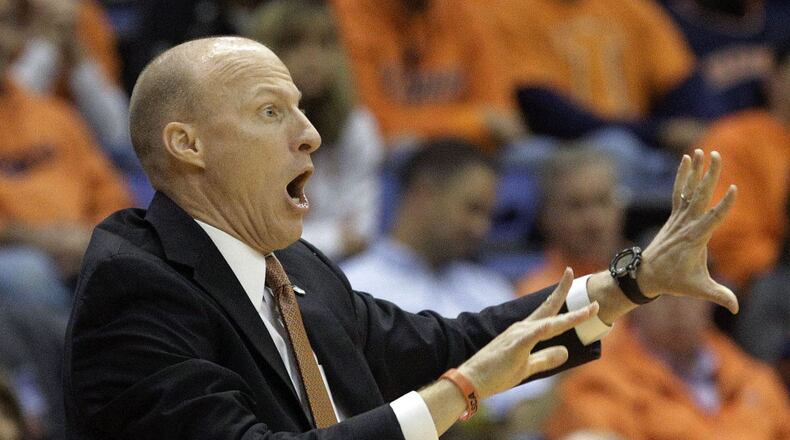A few weeks after three Illinois basketball players were arrested in succession and charged with violent offenses, coach John Groce asserted that the Illini won't shy away from taking responsibility.
"We've shown there is an accountability piece to this," Groce said in March, "and we will discipline our players, if need be, if substantiated. Obviously, we want to be very firm yet fair."
Illinois has a serious decision to make regarding the discipline of guard Kendrick Nunn, who pleaded guilty Wednesday to a misdemeanor battery charge after being accused of hitting a woman in the head, pushing her to the ground and pouring water on her.
Nunn will avoid a conviction on his record if he completes 100 hours of public service, enrolls in a partner abuse prevention program and writes a letter of apology to the victim while under 18 months of court supervision.
Illinois made an appropriate decision by quickly reinstating guard Jaylon Tate to the team Friday after prosecutors dropped a domestic-battery charge against him. Forward Leron Black will have to sit out the first four games of the 2016-17 season after he pleaded guilty to misdemeanor aggravated assault for pulling a knife on a nightclub bouncer.
Now Groce can back up his words from March. He and athletic director Josh Whitman can send a message about Illinois' stance on domestic violence through either a lengthy suspension or a dismissal of Nunn.
Illinois' decision will reverberate nationally.
While the worrisome topic of sexual assaults on college campuses has become a national discussion, domestic violence against college women is just beginning to see the same type of attention. Deservedly so.
Domestic violence on college campuses is not isolated to Illinois and certainly not to Illinois athletes. Twenty-one percent of female college students reported having experienced dating violence by a current partner and 32 percent from a previous partner, according to a 2007 report by the National Coalition Against Domestic Violence.
The Southeastern Conference last May became the first major conference to prohibit teams from signing transfers who were dismissed from other schools for domestic violence or sexual assault allegations. Former South Carolina football coach Steve Spurrier said he had a zero-tolerance policy for any player who hits a woman.
Groce and Whitman spoke about bringing in guest speakers and developing programming to educate players about domestic violence. In a News-Gazette article in April, Groce mentioned only having the players hear a speech by Chris Herren, a former NBA player who struggled with substance abuse.
An athletic department spokesman said Illinois is working on identifying strong speakers on the topic to bring in this summer when the team is together.
The media covering Illinois also have to do better. Several outlets brushed aside common journalistic standards by naming the alleged victims in the domestic-battery cases against Nunn and Tate. That can dissuade future victims of domestic crimes from coming forward because of unwanted and unfair publicity.
There appears to still be a lot to learn about domestic violence.
Nunn's attorney told reporters Nunn is going through a university disciplinary process. Groce and Whitman might see what that outcome brings before making a decision about Nunn's future on the team.
But they don't need to wait on a university decision when a guilty plea has been entered.
When they last spoke to reporters about the domestic-battery allegations, Whitman emphasized his lofty expectations for Illini athletes. He described himself as the "caretaker" of the athletic program and acknowledged the program's "brand and reputation" were at stake.
"These are serious allegations," Whitman said in March. "We'll never shy away from them. We recognize how important and concerning these allegations could be and are."
Now it's time to make a decision that shows Illinois takes a strong stand against domestic violence.
About the Author
Keep Reading
The Latest
Featured



